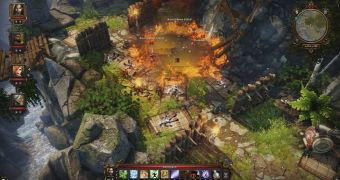The oldschool-flavored role-playing game Divinity: Original Sin was launched at the end of last month, and developer Larian Studios is now already enjoying their merited laurels.
The game is selling well, being constantly positioned at the top of the Steam sales chart, and it's been praised by both players and reviewers.
The studio has even mentioned that they're close to achieving profitability with the title, which is no small feat, considering that they spared no effort to deliver a truly modern AAA experience that is also grounded in the core design philosophy of classic computer RPGs.
Another notable feat is the fact that the studio managed to make and ship the game completely on their own, without the assistance of any publishers and without an extensive marketing campaign before launch.
Swen Vincke, the founder of Belgian video game developer Larian Studios, has mentioned that the game would have never been possible without the assistance of the devoted Kickstarter community, as well as the massive QA operation that took place on Steam Early Access.
"No, there's nothing I miss," Vincke tells GamaSutra when asked whether he misses anything about working in the traditional fashion, having a business arrangement with a publisher.
"I always wanted to be in a one-on-one direct relationship with our players - we even put a global chat into our game while it was in Early Access, so we could talk directly to the players in the game," he shares.
He attempts to create a picture of crowdfunding that portrays it as a much better business model, that allows developers to experiment more and offers them more leeway for failure while working on games that have such a big scope, as Divinity: Original Sin had, because they don't risk going under by missing out on critical milestone payments.
"With a publisher, you send a milestone and you're lucky if someone reads what you're saying, then you get back your thing and if it says 'Milestone accepted' you get your check and off you go," Vincke reveals.
"Milestone-driven development doesn't have real room for failure. Maybe your studio can get by with some failures because you have built a financial buffer, but how the hell are you supposed to know up front exactly how much of a safety net you’re going to need?" he continues.
By pitching their concept to Kickstarter, and then making the transition to Steam's Early Access service, Larian managed to secure funding for the game's development without having to account to anyone but the players.
That also meant that they had much more flexibility when it came to some of the features initially promised, which they decided to cut from the final version of the game instead of having them mar the overall experience.
"We had to admit defeat. We'd basically have to make two games at that point, and that was just impossible," Vincke says regarding the day-and-night system promised on Kickstarter, that was eventually scrapped later in development.
Getting the game's target audience involved in the development process can also have unforeseen beneficial consequences on the overall quality of your product.
"Pretty much the recipe that any developer has to follow is just 'listen to your alpha players'; you have to be able to filter and select things that are doable and don't ruin your entire production, but there's golden knowledge there. It can save you days of meetings on a single feature, because they debate it for you and you often get a very clear analysis of that feature and you just have to implement it," Vincke explains.

 14 DAY TRIAL //
14 DAY TRIAL //